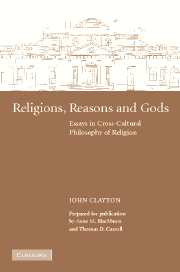Book contents
- Frontmatter
- Contents
- Editorial preface
- Acknowledgments
- List of abbreviations
- 1 Claims, contexts and contestability
- PART I REASON AND RELIGIOUS PLURALISM
- PART II THEISTIC ARGUMENTS IN PRE-MODERN CONTEXTS
- PART III THEISTIC ARGUMENTS IN EARLY-MODERN CONTEXTS
- 8 The debate about God in early-modern French philosophy
- 9 The Enlightenment project and the debate about God in early-modern German philosophy
- 10 The debate about God in early-modern British philosophy
- 11 Beyond the ‘Enlightenment project’?
- Appendix: The 1997 Hulsean Sermon
- Bibliography
- Index
10 - The debate about God in early-modern British philosophy
Published online by Cambridge University Press: 22 September 2009
- Frontmatter
- Contents
- Editorial preface
- Acknowledgments
- List of abbreviations
- 1 Claims, contexts and contestability
- PART I REASON AND RELIGIOUS PLURALISM
- PART II THEISTIC ARGUMENTS IN PRE-MODERN CONTEXTS
- PART III THEISTIC ARGUMENTS IN EARLY-MODERN CONTEXTS
- 8 The debate about God in early-modern French philosophy
- 9 The Enlightenment project and the debate about God in early-modern German philosophy
- 10 The debate about God in early-modern British philosophy
- 11 Beyond the ‘Enlightenment project’?
- Appendix: The 1997 Hulsean Sermon
- Bibliography
- Index
Summary
INTRODUCTION
My thesis concerning theistic arguments in the modern period is fairly straightforward: disembedded from their traditional contexts, in which they had served mainly tradition-specific ends, they were asked more and more to serve tradition-neutral ends by carrying the full load of justifying the rationality of basic religious claims. This was a job for which they were ill equipped, and they eventually collapsed, surviving only when they did not serve the whims of this ‘disembedded foundationalism’. It is less surprising that they failed to do what they were not equipped to do than that they held up for as long as they did. How do we account for that?
FROM MEDIAEVAL TO MODERN: DAWNING OF THE ENLIGHTENMENT IN EUROPE
An unclear divide: the mediaeval mentalité and the marks of modernity
Some accounts of modernity apply equally to the thirteenth century and to post-Enlightenment Europe. It is not surprising that some intellectual historians now push the origins of modernity further and further back into what we once with no sense of unease called the ‘Middle Ages’. This unclear divide has led some to say that there is no unique modernity. It is true that we need thoroughly to reassess the intricate links between modern and mediaeval, as well as the similarity between the modern and what used to be called in our anthropological innocence ‘primitive’, but we should not allow ourselves to become blind to the fact that there remains a distinct difference.
- Type
- Chapter
- Information
- Religions, Reasons and GodsEssays in Cross-cultural Philosophy of Religion, pp. 245 - 291Publisher: Cambridge University PressPrint publication year: 2006



